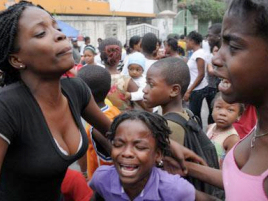The Complex Karma of Haiti
By Vineet Chander | Feb 11, 2010

It is natural, though never pleasant, to question the workings of the Divine when we see (and feel, and weep over) suffering on a grand scale.
In the West, philosophers like Epicurus and David Hume lay it out for us. (Their Eastern counterparts do the same, by the way). Either God wants to prevent suffering but is not able to do so, or he is able but not willing to prevent it. In either instance, the existence of suffering (or evil) in the world is a real challenge to the notion of God — or to a God worth worshiping, at any rate.
One could try to explain the existence of evil actions that people perform (like murder or terrorism) by arguing that God allows us our free will; I touched on this in a blog post about the Mumbai terror attacks a few months ago.
But what about the suffering that is unleashed by an earthquake or hurricane or a baby who dies of SIDS in his crib? What about the horrible, sickening, painful things that “just happen” one morning? What about a tragedy like the devastating 7.0 earthquake in Haiti.?
Does Hinduism have something to say about Haiti?
I think it does. But first, some more illumination on the problem before us.
In his thoughtful BBC piece, philosopher David Bain explores this problem in some detail. Here’s a sampling:
Doesn’t our world contain a surplus of suffering? People do truly awful things to each other. Isn’t the suffering they create enough for soul-making? Did God really need to throw in earthquakes and tsunamis as well?
Suffering’s distribution, not just its amount, can also cause problems. A central point of philosopher Immanuel Kant’s was that we mustn’t exploit people – we mustn’t use them as mere means to our ends. But it can seem that on the soul-making view God does precisely this. He inflicts horrible deaths on innocent earthquake victims so that the rest of us can be morally benefited.
That hardly seems fair.
It’s OK, some will insist, because God works in mysterious ways. But mightn’t someone defend a belief in fairies by telling us they do too? Others say their talk of God is supposed to acknowledge not the existence of some all-powerful and all-good agent, who created and intervenes in the universe, but rather something more difficult to articulate – a thread of meaning or value running through the world, or perhaps something ineffable.
But, as for those who believe in an all-good, all-powerful agent-God, we’ve seen that they face a question that remains pressing after all these centuries, and which is now horribly underscored by the horrors in Haiti. If a deity exists, why didn’t he prevent this?
Newsweek’s Lisa Miller echoes Bain’s why in her own piece, poignantly (and sarcastically) titled “Why God Hates Haiti.”
Now, with as many as 100,000 dead in last week’s earthquake, a sensible person of faith has to grapple with the problem of what scholars call theodicy. If God is good and intervenes in the world, then why does he make innocents suffer? Why, as Job might have said, would God “crush an impoverished people with a tempest and multiply their wounds without cause? He will not let them get their breath.”
Over the next weeks, sensible clerics will struggle with what to say. “The really smart ones,” says Ehrman, “will be saying that God is mysterious and we can’t explain everything.” Others will teach that the earthquake is the work of the Devil or that believers can find blessings in the calamity, for in heaven the dead will finally find tranquility and repose. As a Roman Catholic blogger wrote last week, “This world is not all there is.”
Both Bain and Miller also quote — and take issue with — loudmouth TV evangelist Pat Robertson’s predictably crude suggestion that the earthquake was God’s curse on Haiti for a supposed pact their forefathers made with the Devil. (Bain and Miller weren’t the only ones to call Pat out on this. Over at Huff Po, my Princeton colleague and f


